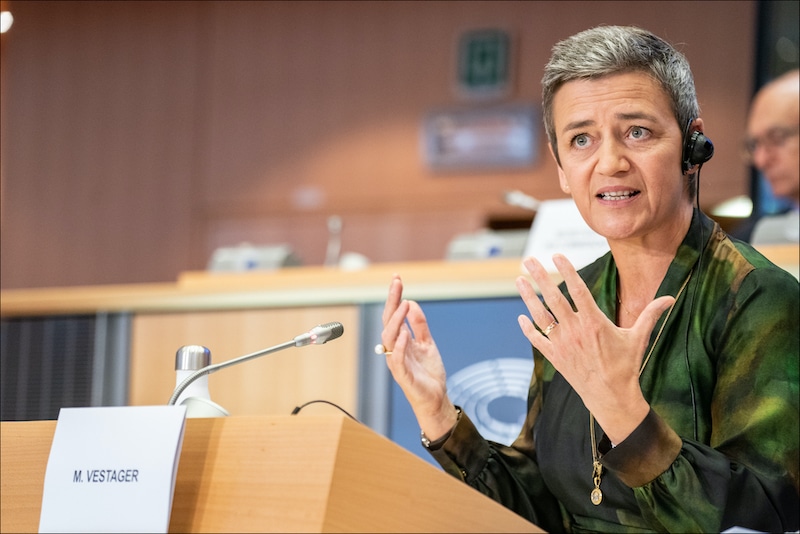The European Union tries in every way to put a stop to the excessive power of Big Tech, or the giants of the tech universe.
And this time it does targeting the voice assistant market. The fear is that Alexa, Siri and Assistant are putting the competition at serious risk.
The consequence is that the Antitrust Authority could launch specific investigations in this direction in the coming months.
Let’s find out why the European Union has moved against the dominance of big techs in the world of voice assistants. Then let’s see what other measures the EU has taken in the past few hours to limit the power of the major world brands in the technology industry.
Voice assistants targeted by the EU
The stimulus was given by the indications provided by more than 200 companies in the sector active in Europe, Asia and the USA, and by a public consultation.
The data collected prompted the EU to investigate the exclusive and binding practices of the sale and use of voice assistants from Google, Amazon and Apple. That is, respectively, Assistant, Alexa and Siri. The methods of massive collection of user data and the creation of a market that effectively prevents the development of competition will be monitored.
 Margrethe Vestager
Margrethe Vestager
The slogan of Margrethe Vestager
The results of the sector survey were illustrated by Margrethe Vestager, Vice President of the European Union.
Vestager said: “The Internet of Things sector is increasingly becoming a part of our daily life. The final results of our sector inquiry confirm the concerns identified in the preliminary report. This is a market with high barriers to entry, few vertically integrated players and criticalities regarding access to data, interoperability or exclusive practices “.
Own the sector investigation could lead the Antitrust to launch new initiatives. At the same time, the EU vice president hopes that the current situation will stimulate competing companies “to proactively address these concerns”. In this sense, Vestager continues, “the Commission takes note of Amazon’s recent revision of some of the conditions applicable to its automatic and intelligent product reordering services”.
The down of Alexa
Curious coincidence: just in the hours in which the European Union expresses concerns about the domination of Big Tech, the voice assistant of Amazon has been having a tantrum.
Alexa, on Friday 21 January, created problems all over the world, with inefficiencies and sudden downs. Or not recognizing user inputs. In our country alone, as we reported in another article, in a few hours there were more than 600 reports of Amazon’s voice assistant malfunction. Alexa responded to any prompts with an error message.
Difficulties were also encountered on the Amazon Web Services cloud computing services.
Around 12.00 (Italian time) the problem seems to have disappeared. We are awaiting a note from Amazon, also to find out the cause of the prolonged global disservice.
Il Digital Services Act
The European Union’s interest in Big Tech’s control over voice assistants is just one of the moves made by Europe to limit the power of tech giants.
The vote in plenary of the European Parliament is very recent, on Thursday 20 January. The text on the Digital Services Act, the proposed European regulation that contains the new rules on online intermediaries, including Big Tech, was approved. It is only a proposal of the final text, which the European Parliament will now discuss with national governments. The first appointment is set for January 31st.
What is the Digital Services Act
The Digital Services Act was presented by the European Commission on 15 December 2020.
It is about a text that rethinks the rules on the transparency of platforms. And it obliges to report the moderation of the contents, leaving the possibility to the users to contest the decisions made.
The approved text
The text of the Digital Services Act was approved on January 20 in plenary assembly with 530 votes in favor, 78 against and 80 abstentions.
The main measures contained in the proposal include the removal of illegal or harmful content and greater transparency on algorithms. In addition to Big Tech’s legal liability to users, they will have more options to deny consent to targeted advertising.
In short, a series of rules that shift the balance from the tech giants to the users of their services.
MEP Christel Schaldemose, head of the dossier for the EU Parliament, said: “Online platforms have become increasingly important in our daily life, bringing new opportunities, but also new risks. It is our duty to make sure that what is illegal offline is illegal online. We have to make sure we put digital rules in place for the benefit of consumers and citizens ”.















Leave a Reply
View Comments